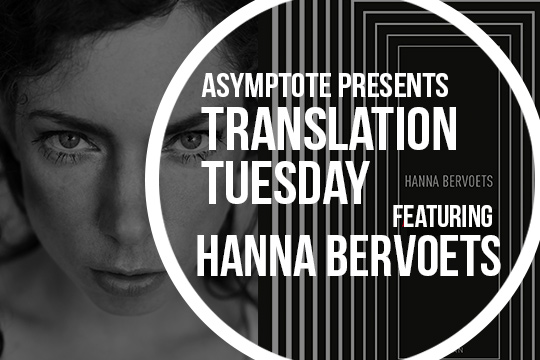Today we present a haunting extract from a newly translated novel by critically acclaimed Dutch writer, columnist, and journalist Hanna Bervoets. Stranded in a school building after a catastrophic event leaves the outside world uninhabitable, a TV crew and the subjects of their documentary struggle to survive in Bervoets’s post-apocalyptic universe. From the scattered diary pages of the crew’s researcher, we learn the troubling story of everything there was, and the little there was left.
We haven’t turned on the computers in a long time. The last time we turned them off again, there still wasn’t any internet. Until then we still opened the browsers every day. Though perhaps that was just habit, like in the old situation, tearing a page off my calendar every morning, even though I already knew full well what day of the week it was, or what date. But the more often you do something, the stranger it is not to do it. So I can’t say whether we still believed the internet would come back. Just that we kept hoping it would.
It is perhaps hard for you to imagine how important the internet once was. I also find it hard to imagine. Perhaps it really wasn’t all that important.
But I think it was.
People said: You can find anything on the internet. But you had to search for it first. Even more than searching, we liked looking at things other people thought we wanted to find: Pictures in which they stretched out one arm to take their own picture; songs about relationships that had just begun or just ended; videos of animals or babies doing things.
Me, I had a preference for videos of cats. I didn’t love cats. But I did love to see cats getting tickled, walking on a piano, or falling off something. I also loved videos with guinea pigs.
Of course we weren’t just watching cats and guinea pigs. Many people watched other people. In the old situation you could also do that at the supermarket. But at the supermarket most of those other people had their clothes on: You didn’t often run into people without any clothes on. Scarcity creates demand and demand creates supply. Supply caused the scarcity to decrease, but not the demand for people without clothes. And so the internet was soon full of naked bodies. If you paid you could even make the naked bodies move.
But, above all, the internet was a communication medium. Yes, communication might have even been the most important constant in the old situation. All day we were sending messages. Some messages had a specific goal. They were calls to action: To be at the meeting around 3:00 or to bring Thai food. The intentions behind other messages were more vague.
“I’m going to have dinner now.” “I’m listening to a song.” “I read an article in The Guardian.”
Such messages were aimed at people who hadn’t been searching for them but found them anyway, all through the day, on their computers, tablets, or phones. We didn’t know that we wanted to read this information. But then again, these messages didn’t have anything to do with wanting. They were there. Like the weather. Before you could even wonder whether it was raining, you saw that it was raining. Before you could wonder if you wanted to know what other people had eaten that day, it was there for you to see.
The strange thing was, we didn’t realize the importance of these messages then. Some people said: It’s all nonsense, I’m not doing this. Other people said: It’s all nonsense, but I’m doing it anyway.
Only now do I understand what purpose those messages really had. They assured us that there were others out there—the only information that really matters, and the only information we craved during the first days of the new situation.
But craving something that isn’t there is torture. To spare ourselves, we started craving other things. Things that were there. Though they were becoming scarcer by the day.
Translated from the Dutch by Florian Duijsens
Click here for more information about Everything There Was.
Hanna Bervoets (b. 1984) writes novels, essays, and screenplays. Bervoets won the 2009 Debut of the Year Award for her first novel, Or, How, Why. Its follow-up, Dear Céline, was awarded the Opzij Literature Prize 2012 for best book by a female Dutch author. It has since been adapted for the big screen. After Dear Céline, she made her definitive breakthrough as a novelist with the acclaimed bestseller Everything There Was. Her next novel, Efter, was nominated for the BNG New Literature Prize and reached the longlist of the Golden Book Owl and the Libris Literature Prize. The film rights of Efter have been sold to prominent Dutch producer NL Film. Bervoets’ fifth novel, Ivanov, came out in January 2016 and has received high critical acclaim.
Florian Duijsens is a writer, editor, and translator who teaches at Bard College Berlin’s “Language & Thinking” program. He currently serves as fiction editor of SAND Journal and co-hosts the bimonthly “Dead Ladies Show.” He recently contributed an introduction to Grasses and Trees, the first collection of Lydia Davis’s A.L. Snijders translations from the Dutch. You can find more of his work in Asymptote, The Guardian, and other publications, both online and in print.
*****
Read More from Translation Tuesday:
Translation Tuesday: A selection from “Written in the Dark”
Translation Tuesday: An excerpt from “The Midwife” by Katja Kettu
Translation Tuesday: An excerpt from “One Hundred Shadows” by Hwang Jungeun

